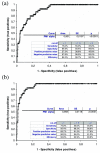Clinical evaluation of autoantibodies to a novel PM/Scl peptide antigen
- PMID: 15899056
- PMCID: PMC1174964
- DOI: 10.1186/ar1729
Clinical evaluation of autoantibodies to a novel PM/Scl peptide antigen
Abstract
Anti-PM/Scl antibodies represent a specific serological marker for a subset of patients with scleroderma (Scl) and polymyositis (PM), and especially with the PM/Scl overlap syndrome (PM/Scl). Anti-PM/Scl reactivity is found in 24% of PM/Scl patients and is found in 3-10% of Scl and PM patients. The PM/Scl autoantigen complex comprises 11-16 different polypeptides. Many of those proteins can serve as targets of the anti-PM/Scl B-cell response, but most frequently the PM/Scl-100 and PM/Scl-75 polypeptides are targeted. In the present study we investigated the clinical relevance of a major alpha helical PM/Scl-100 epitope (PM1-alpha) using a newly developed peptide-based immunoassay and compared the immunological properties of this peptide with native and recombinant PM/Scl antigens. In a technical comparison, we showed that an ELISA based on the PM1-alpha peptide is more sensitive than common techniques to detect anti-PM/Scl antibodies such as immunoblot, indirect immunofluorescence on HEp-2 cells and ELISA with recombinant PM/Scl polypeptides. We found no statistical evidence of a positive association between anti-PM1-alpha and other antibodies, with the exception of known PM/Scl components. In our cohort a negative correlation could be found with anti-Scl-70 (topoisomerase I), anti-Jo-1 (histidyl tRNA synthetase) and anti-centromere proteins. In a multicenter evaluation we demonstrated that the PM1-alpha peptide represents a sensitive and reliable substrate for the detection of a subclass of anti-PM/Scl antibodies. In total, 22/40 (55%) PM/Scl patients, 27/205 (13.2%) Scl patients and 3/40 (7.5%) PM patients, but only 5/288 (1.7%) unrelated controls, tested positive for the anti-PM1-alpha peptide antibodies. These data indicate that anti-PM1-alpha antibodies appear to be exclusively present in sera from PM/Scl patients, from Scl patients and, to a lesser extent, from PM patients. The anti-PM1-alpha ELISA thus offers a new serological marker to diagnose and discriminate different systemic autoimmune disorders.
Figures



References
-
- Tan EM. Antinuclear antibodies: diagnostic markers for autoimmune diseases and probes for cell biology. Adv Immunol. 1989;44:93–151. - PubMed
-
- Reimer G, Steen VD, Penning CA, Medsger TA, Jr, Tan EM. Correlates between autoantibodies to nucleolar antigens and clinical features in patients with systemic sclerosis (scleroderma) Arthritis Rheum. 1988;31:525–532. - PubMed
Publication types
MeSH terms
Substances
LinkOut - more resources
Full Text Sources
Medical
Molecular Biology Databases
Research Materials
Miscellaneous

